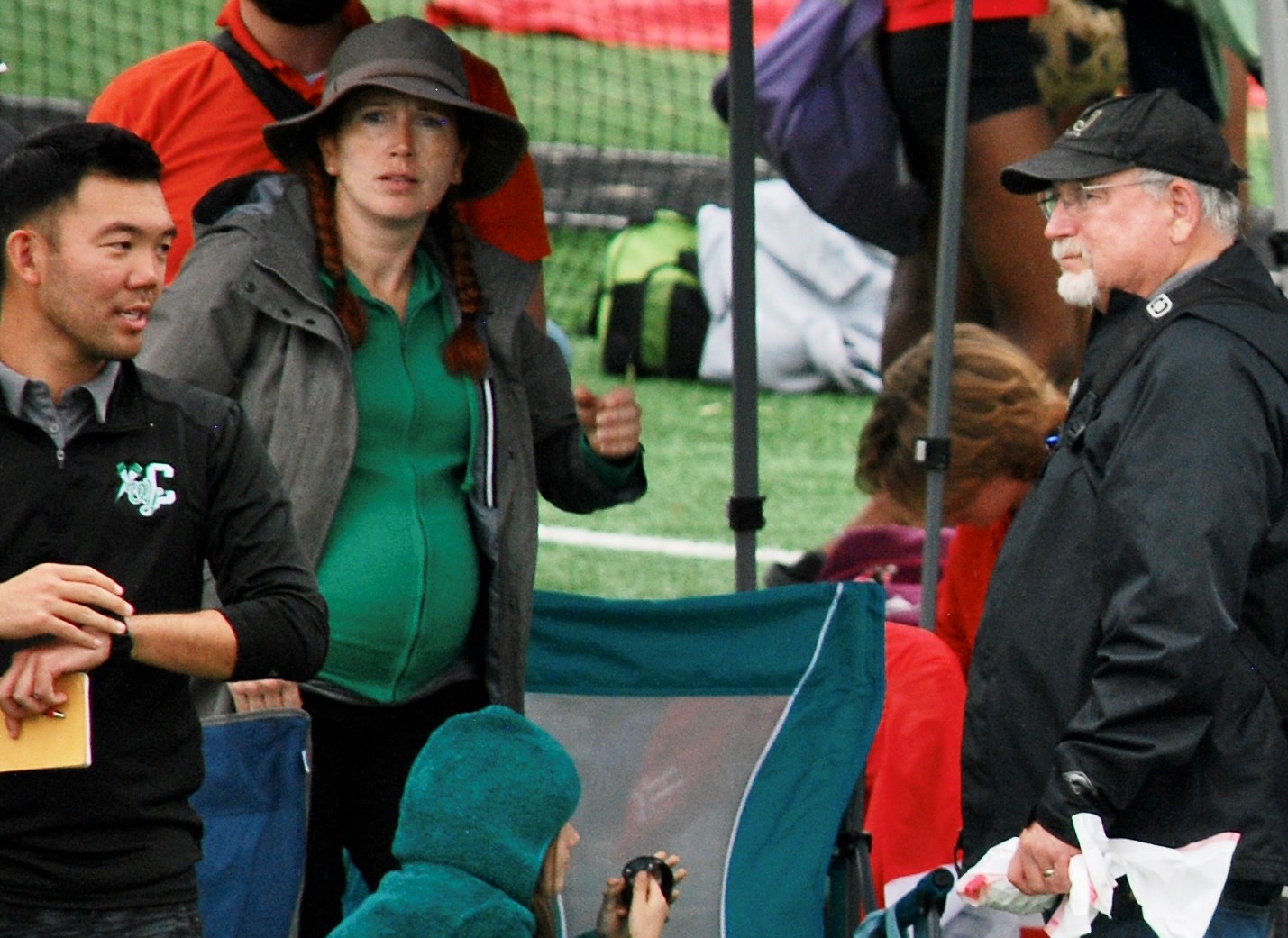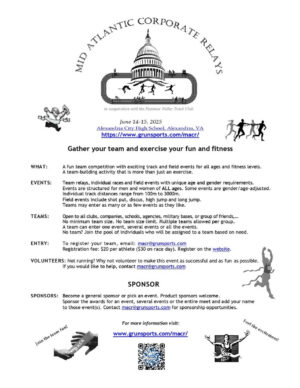Grace Landau knew how to cry. As a toddler, she wouldn’t nap, and it was driving her mother, Kate, a little nuts.
“I’d have to lie down with her if she was going to nap,” she said. “I couldn’t lie down all day, but she was a really colicky baby. Nothing else seemed to make her happy”
Grace would, however, sleep in the stroller. It was a revelation that gave her single mother options, and brought her back to a sport that once defined her life, for the good and the bad.
It had been 14 years since Landau, finishing her fifth year at Georgetown, stopped running in the middle of a long struggle with various eating disorders that she had only recently coped with. Since then, she’s run 2:31 for the marathon and is heading to her second Olympic Trials, her first since 1996.
But she started pushing Grace, she was better. Just being able to have Grace was proof. She was also past the barrier that she identified as starting her troubles. Barriers she dealt with as she started running again, the weight of the stroller and the hills all over Tacoma, Wash., were helpful.
Growing up in upstate New York, Landau was recruited to her school’s cross country team in seventh grade by her coach, who saw her while he was working as a softball umpire.
“I wasn’t really good at softball or gymnastics anyway,” she said. “I was always fast in gym class and things went pretty well when I started running cross country.”
A little more than ‘pretty well.’ She was soon on her school’s varsity team as a seventh grader, and by eighth grade had won the New York Federation meet.
“For me it was always an internal drive to see what I could do and to be my best,” she said. “I was always challenging myself. I liked to win, but it wasn’t about the competition. It was about beating my own personal best time. I didn’t even like the attention — I’d hide from reporters — but I loved the training runs.”
She liked things the way they were.
“I had heard stories of runners who were stars going through puberty and not doing well after,” Landau said. “I was afraid of that, and I was determined to delay puberty and keep my weight low.”
So she restricted her diet to what she ate in seventh and eighth grades, while increasing her training load.
“I knew I was messed up,” she said. “I’d look in a psychology book and see exactly what I was doing. I knew it was bizarre to count calories in bread or count the calories in communion bread, but I was afraid to stop because I was afraid I was going to get big and I’d never run again. I felt like if I gave up control I wouldn’t get it back.”
When Landau’s body started breaking down in 11th grade, a year after she was third at the Kinney National Cross Country Championships, her parents and coach intervened, but Landau did her best to game the system. When her therapist told her she could run again when she gained a certain amount of weight and took time off, she tipped the scales with a stomach full of water.
“The majority of my high school was dealing with that,” she said. “I don’t regret it in a way that makes me feel bad about myself. It’s something that happened that I hope other people can learn from. I’m glad there’s a lot more open discussion about it now than when I was a teenager.”
She didn’t race her last two years of high school, but her body of work was enough to get her recruited to Georgetown, where her older sister was running.
Landau didn’t run for her first three semesters, either, as she started collecting 25 stress fractures over five years.
“I’d cross train like crazy, train for eight weeks, race and get hurt again,” she said. “I was depressed some of the time but I had good times too.”
By the end of her sophomore year, she was running again and qualified for the Olympic Track Trials for the 10k. Once she finished second at the NCAA championships in the 10k and sixth in the 5k, she kept training without a break and eventually ran about 90 seconds slower at the Trials in Atlanta.
“It was still cool to be 19 and running against the professionals,” she said.
She went back to her cycle of injury and faux recovery.
“I was always aware I was playing the ‘recovery card,’ and I think my parents and coaches knew too,” Landau said. “Everyone else had to be aware, it was part of my identity: I was the girl who went hard exercising a lot and didn’t eat much. They’d recognize if I changed that about myself.”
Finishing in the back at the 1999 NCAA Championships in the 10k convinced her she shouldn’t stick around D.C. and go to medical school.
She got a fresh-ish start in Berkeley, Calif., but her compulsive exercise followed her when she bought a road bike.
“I was biking two or three hours a day and doing an hour and a half on the stairmaster,” she said. “I hadn’t really changed, I just had a new way to work out. I was not eating all day and then binging at night.”
When she thought about pursuing a professional cycling career in 2010, her body rebelled on her again. She couldn’t bike more than a half hour, cancelled a hiking trip to the Grand Canyon and spent 10 days in bed.
“I know I couldn’t go on like that,” she said. “I knew it was time to take care of this.”
Among her three specialists, the nutritionist challenged her the most.
“She planned these large volumes of food that were so foreign to me,” Landau said. “At first I felt fat and ugly, but then the Prozac kicked in and that got easier, but after so many years of restricting my diet, I just couldn’t wrap my head around (those quantities).”
Things changed fast. She adopted a dog. She socialized more. She had a menstrual cycle. She was allowed to walk, but not run. Two years later, she had a baby.
They moved to New York, but she hated it. Then back to Berkeley. But after losing her job while she dealt with postpartum depression, she and Grace were living in a friend’s extra room.
“We were on food stamps and I was dipping into my retirement savings,” she said.
Thing went north when she did, after she got a new physician’s assistant job in Tacoma. While she waited for her licensing to be active, she started running with Grace in the stroller, after running a total of 100 miles the previous 14 years.
When her sister visited for Thanksgiving, they ran a turkey trot, and Kate ran 19:08.
“I couldn’t believe I could run that pace for three miles,” she said. “I felt good, and not like I did when I was running when I was younger.”
She ran a 1:25 half marathon in 2014, and in 2016, then won the Tacoma City Marathon in 2:43:51 and the Portland Marathon in 2:38:45. She added titles at Rock ‘n’ Roll Arizona and Eugene in 2018 and Miami in 2019, while dropping her PR to 2:31:56 in Boston in 2019.
She was the second master at the 2017 Boston Marathon, and finished 13th overall there in 2019.
Now 43, she doesn’t have a fraction of the miles on her legs that her peers do. She runs when she can, before picking Grace from daycare when she was younger, or running at lunch. Now back in Tacoma after a short move to Jacksonville in 2019, she faces a long commute and does a lot of her training on a treadmill.
Coming into the Trials, she has the 28th fastest recent marathon, but she’s focusing on Boston again.
James McKirdy has been coaching her over the past year, and he recognizes the parameters in which she has to fit her training.
“She and Rebecca Groner, on the master’s level, have real choices to make between being a mother, working full time and providing and then chasing after their individual dreams,” he said.
Landau’s dream right now is to focus on the Boston Marathon, though she will still compete at the Trials, where McKirdy thinks her racing style will pay off.
“We won’t take it lightly,” he said. “The idea behind her training has been to handle both in a very strategic way: We decided to put more emphasis on her long runs so that when she gets to Atlanta, it won’t be a shock to her system. She’s already run 23-, 24-, 25-mile long runs with more hills than she’s going to see in Atlanta, so she’s going to be surprised by how easy it seems.
“My strategy for her is to not race the field. Our plan is to be strategic every single mile when other people are being aggressive and challenging early on.
With her goal of Boston in mind, it’s hard for Landau to judge her fitness, particularly as she adjusts to her new job’s demands.
“I’ve got a lot of other things to balance,” she said. “I can’t dedicate everything to running, so I have goals, but they won’t break me if I don’t hit them.”
Now 7, Grace doesn’t accompany her mother on runs in the stroller, but she knows it’s important to her.
“She knows it makes me happy,” Kate said. “She never has a problem with me going for a run, if she’s going to play date so I can get out there.”
Grace won’t join Landau in Atlanta, which is giving Kate a vacation of sorts.
“I’m looking forward to the time alone in the hotel room,” she said. “I don’t think she would enjoy hanging out while I’m being lazy for a few days.”
Recent Stories
Looking for our race calendar? Click here Submit races here or shop local for running gear
Hero Dogs 5K9
Hero Dogs Inc will host its 5th Annual 5K9 race at the Congressional Cemetery on Saturday, May 17th, beginning at 8 am. There will also be a 1K Fun Run. The 1K Fun Run will start at 8 am sharp
Mid Atlantic Corporate Relays
Team relays, individual races and field events with unique age and gender requirements. Events are structured for men and women of all ages.
Some events are gender/age graded. Individual track distances range from 100m to 3000m.
Field events include shot






